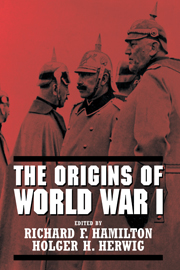Book contents
- Frontmatter
- Contents
- List of Tables and Maps
- Contributors
- Acknowledgments
- 1 World Wars: Definition and Causes
- 2 The European Wars: 1815–1914
- 3 Serbia
- 4 Austria-Hungary
- 5 Germany
- 6 Russia
- 7 France
- 8 Great Britain
- 9 Japan
- 10 The Ottoman Empire
- 11 Italy
- 12 Bulgaria, Romania, and Greece
- 13 The United States
- 14 Why Did It Happen?
- 15 On the Origins of the Catastrophe
- Appendix A Chronology, 1914
- Appendix B Dramatis Personae
- Appendix C Suggested Readings
- Index
14 - Why Did It Happen?
Published online by Cambridge University Press: 05 August 2012
- Frontmatter
- Contents
- List of Tables and Maps
- Contributors
- Acknowledgments
- 1 World Wars: Definition and Causes
- 2 The European Wars: 1815–1914
- 3 Serbia
- 4 Austria-Hungary
- 5 Germany
- 6 Russia
- 7 France
- 8 Great Britain
- 9 Japan
- 10 The Ottoman Empire
- 11 Italy
- 12 Bulgaria, Romania, and Greece
- 13 The United States
- 14 Why Did It Happen?
- 15 On the Origins of the Catastrophe
- Appendix A Chronology, 1914
- Appendix B Dramatis Personae
- Appendix C Suggested Readings
- Index
Summary
The answer to that question regarding the origins of World War I is to be found in the circumstances of four of the five major European powers: Austria-Hungary, Germany, Russia, and France. In each of the four “cases,” the decision-making coterie saw their nation as in decline or at least as seriously threatened. To halt the decline or to block the threat, the decision makers felt that some demonstration of strength was imperative. It was the sense of threat and the resultant need to address that decline that led them to the key decision, namely, to participate in the coming war. Our view, in short, is that these strategic considerations were paramount.
The Major Powers
Austria, once the commanding central European presence, the state that had defeated and pushed back the Ottomans, found itself tagged as the second “sick man of Europe.” This empire had been trounced by Napoleon, yet in alliance with other powers appeared among the victors and, for another half-century, dominated continental Europe. But then came the serious threats of revolutions in 1848–49, necessitating being “saved” by Russian intervention. Thereafter came a cluster of defeats, these at the hands of Italian nationalists, allied briefly in 1859 to the France of Napoleon III. This debacle was followed closely by defeat at the hands of Prussia in 1866. Reflecting the instabilities of a multinational society, the empire, in the Compromise of 1867, was forced to divide sovereignty and to reorganize as Austria-Hungary.
- Type
- Chapter
- Information
- The Origins of World War I , pp. 443 - 468Publisher: Cambridge University PressPrint publication year: 2003
- 1
- Cited by

